
Due diligence and corporate accountability in the arms value chain
March 27, 2024Given the nature of the products commercialised by arms value chains, and their potentially devastating impacts on human dignity, states have a strict obligation to control operators in this economic sector. But is compliance with export controls sufficient for companies to assess risks to human rights? This report analyses the possibility and necessity of establishing corporate responsibility and

IPIS Insights: The Arms Trade Treaty. Prospects and Challenges as it “enters into force”
December 23, 2014The entry into force of the Arms Trade Treaty (ATT) on 24 December 2014 is seen as a sign of hope that irresponsible transfers of conventional arms will at last begin to be eradicated. Declarations of commitment by states around the world to implement the ATT have snowballed over the past year since the UN General Assembly voted decisively on 2 April 2013 to adopt the treaty. In this IPIS Insight,

The Adverse Human Rights Risks and Impacts of European Companies: Getting a glimpse of the picture
October 20, 2014This report presents the findings of a study undertaken by IPIS and commissioned by the European Coalition for Corporate Justice on the extent to which European companies are identified in concerns about adverse human rights risks and impacts. Gathering concerns raised regarding the human rights risks and impacts of companies listed on the UK’s FTSE 100, France’s CAC 40 and the German DAX 30, the
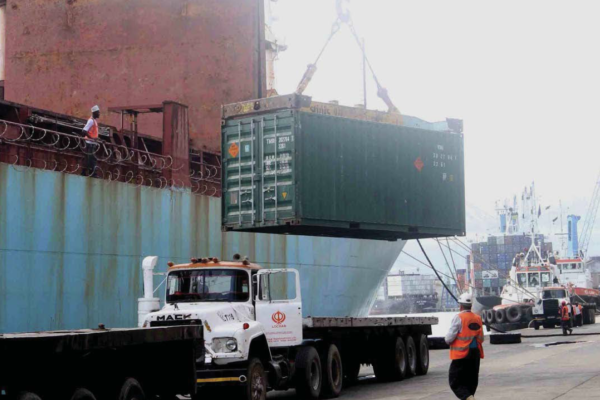
Supply Chains and Transport Corridors in East Africa
June 1, 2014Transport infrastructure plays a key role in boosting a country or region’s economic development. IPIS and TransArms have ascertained on several occasions that the underdevelopment or degeneration of transport infrastructure is a problematic issue across a number of African countries and regions. This report analyses the current logistics situation in Eastern Africa, and the logistic challenges fa

IPIS Insights: The EU draft law on conflict minerals due diligence: a critical assessment from a business & human rights standpoint
April 4, 2014On the 5th of March 2014, the European Commission proposed a responsible trading strategy for minerals from conflict zones. The proposal took place within a specific and timely context. As IPIS has long documented, the exploitation of natural resources can have adverse human rights impacts. Businesses operating in conflict-affected or fragile regions should therefore ascertain whether their direct

IPIS Insights: The 2nd Annual United Nations Forum on Business and Human Rights, Geneva 2013
January 14, 2014From the 2 – 4 December 2013, IPIS attended the United Nations Forum on Business and Human Rights. The Forum was established by the Human Rights Council and is under the guidance of the UN Working Group on Business and Human Rights. Around 1,700 people registered for this year’s Forum, spanning Civil Society Organisations, individuals who have been adversely affected by business activity, State de

IPIS Insights: Kimberley Process: observations from the sidelines. Part I
November 20, 2013Ten years after the launch of the Kimberley Process Certification Scheme (KPCS) this paper is the first in a two part series providing an overview of where the Kimberley Process and international efforts to combat the trade in conflict diamonds currently stand. It will analyse some of the present challenges facing the system and some of the potential solutions on the table. This part (Part I) will
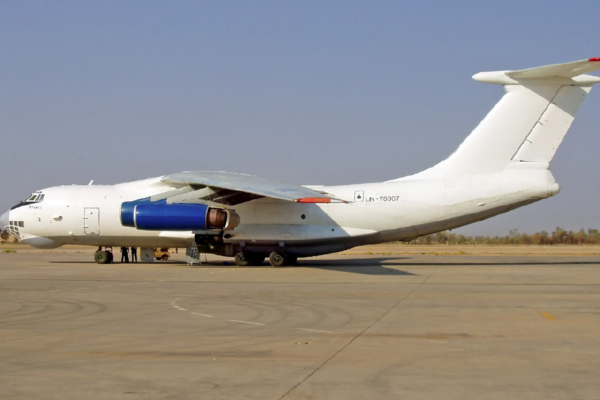
Ambushed in Bangkok? The U.N. Panel on North Korea and the case of the IL-76 “4L-AWA”
November 19, 2013This new IPIS/Transarms report explains why the conclusion of the latest United Nations report on North Korea sanctions about an arms flight grounded in Thailand is not supported by facts, but based on a misalliance of wrong and misleading information gleaned both about the cargo aircraft. its flight and the entities involved, together with erroneous interpretations of standard aviation practices
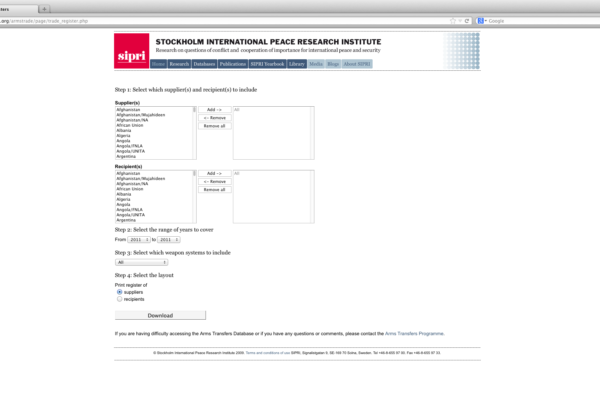
Online public databases for Arms Trade Research
August 29, 2013In recent years IPIS has published several publications in collaboration with local African organisations. Such cooperation has allowed us to share know-how from over 30 years of research experience while benefitting from our partners’ networks and understanding of local issues. Although IPIS’ research assignments are often limited to a few months, we are increasingly trying to improve our working
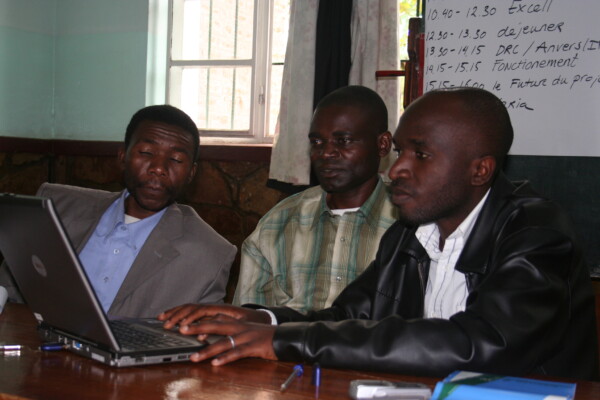
Planning and Running a Research Project
August 12, 2013In recent years IPIS has published several publications in collaboration with local African organisations. Such cooperation has allowed us to share know-how from over 30 years of research experience while benefitting from our partners’ networks and understanding of local issues. Although IPIS’ research assignments are often limited to a few months, we are increasingly trying to improve our working
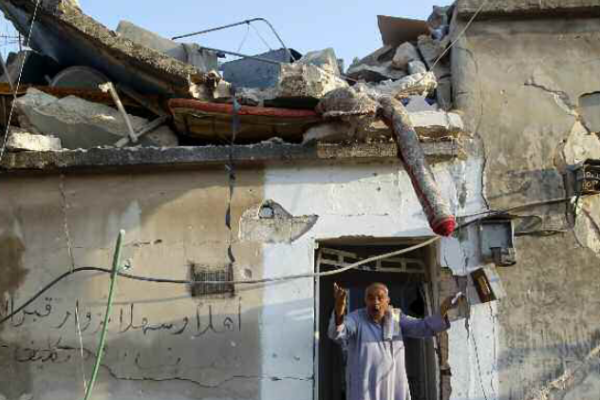
Major Powers Fuelling Atrocities. Why the world needs a robust Arms Trade Treaty
March 15, 2013IPIS contributed to the research for this AI report. Every year, thousands of people are killed, injured, raped and forced to flee from their homes as a result of abuses and atrocities committed with conventional arms and ammunition. Harrowing testimonies and images from conflict zones and human rights crises around the world underline the urgent need to end irresponsible arms transfers and illicit
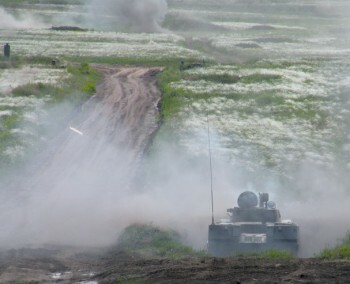
The Arms Trade Treaty: Building a Path to Disarmament
March 9, 2013The goal of this article is to examine and suggest proposals that could enhance the role of the international Arms Trade Treaty—presently in discussion at the United Nations—in the regulation of the international arms trade and in addressing the role of the legal trade in: a) providing the bulk of the arms used in armed conflicts, armed violence and human rights abuses; b) the excessive arming of

Pinocchio Ltd. The NRA and its corporate partners: US shipments of small arms ammunition by sea
March 5, 2013The National Rifle Association (NRA) claims to have monitored in the last 20 years all United Nations activities that could impact Second Amendment rights. Its latest target is the Arms Trade Treaty (ATT), an international treaty to establish common international standards for the import, export, and transfer of conventional arms presently under discussion at the United Nations. The international

A Code of Conduct for Arms Transport by Air. Transport Services under an Arms Trade Treaty Series
August 12, 2012This report is a discussion of some key considerations for the development of and “Air Cargo Industry Voluntary Code of Conduct relating to the transport of arms, ammunition and other military equipment” (ACI Code). The purpose of such a Code is to encourage as many aviation companies and other actors as possible in the air cargo industry to adhere to existing and new standards relating to the tr

Rough Seas. Maritime Transport and Arms Shipments
July 6, 2012As stated by the authors in their report “Transparency and Accountability” (February 2012), the Chairman’s Draft Paper (14 July 2011) presented by the Arms Trade Treaty’s Preparatory Committee (ATT PrepCom) included within the ATT scope certain activities that should fall under the category of “services”, such as transport and brokering. However, no provision has been envisaged for the monitoring
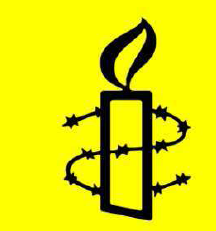
Vlaams Wapenhandeldecreet: Analyse en aanbevelingen
March 9, 2012In november 2011 werd in het Vlaams Parlement een ontwerp van decreet ingediend ter vervanging van de federale wet van 5 augustus 1991 over in-, uit- en doorvoer van militair materieel, dit als gevolg van de regionalisering van de bevoegdheid inzake wapenhandel en van de Europese ICT-richtlijn die in mei 2009 goedgekeurd werd door de Raad en het Europees Parlement. Amnesty International toetste di

Study on the development of a framework for improving end-use and end-user control systems
February 16, 2012(UNODA Occasional Papers, No. 21, December 2011) Already, in 2002, the Security Council called upon States to establish an effective national end-user certificate system and to study the feasibility, as appropriate, of developing such a system at the regional and global levels, as well as information exchange and verification mechanisms. This study assesses existing practices regarding end-user ce

Transparency and Accountability. Monitoring and Reporting Methods Under An Arms Trade Treaty
February 8, 2012Without an understanding of the existing practices of States regarding their commonly agreed standards for the monitoring and reporting of their international transfers of conventional arms, it will be very difficult to draft many of the basic provisions of the Treaty to ensure compliance and enforcement. This report therefore seeks to clarify and discuss existing terminology and reporting practic
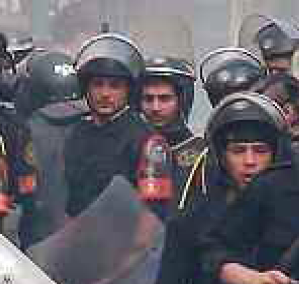
Arms Transfers to the Middle East and North Africa: Lessons for an effective arms trade treaty
November 7, 2011The numerous unlawful killings and other gross human rights abuses committed in response to the mass protests and demands for change that have gripped the Middle East and North Africa (MENA) region since late 2010 underscore, both vividly and tragically, the urgent need for the establishment and implementation of an effective global Arms Trade Treaty (ATT). All across the region, government author
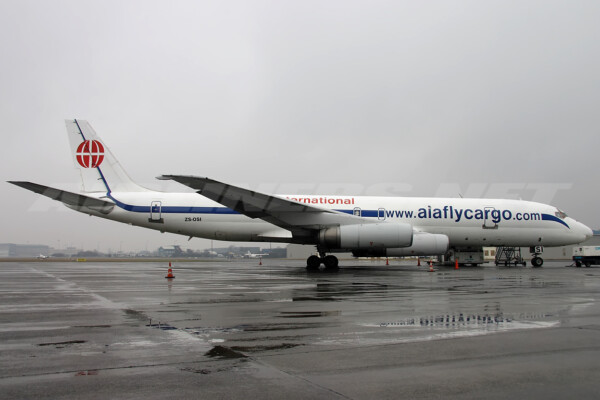
The Arms Flyers. Commercial Aviation, Human Rights, and the Business of War and Arms
June 30, 2011In the last decades, the “business of war” has attracted thousands of civilian transport and logistics companies, especially in the aviation sector. State and non-State actors engaged in armed conflicts or in military operations that require substantial logistic support have increasingly resorted to the services of civilian transport operators to fulfill their transport and logistics needs. For ai

